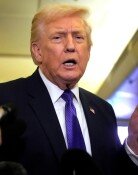U.S., Japan Turn Up Heat on N. Korea
U.S., Japan Turn Up Heat on N. Korea
Posted July. 18, 2006 03:27,
The international community centering on the U.S. and Japan is raising the level of pressure against North Korea after the U.N. Security Council (UNSC) adopted a resolution to sanction the North.
The U.S. plans to strengthen the existing financial sanctions and the Proliferation Security Initiative (PSI) of weapons of mass destruction (WMD) while urging the North to return to the six-party talks, and Japan, which has been requesting firm countermeasures, is reviewing specific measures to sanction.
Secretary of State Condoleeza Rice warned on July 17 Korean time that the U.S. will put additional pressure on the North if it doesnt return to the six-way talks. She held a press conference at St. Petersburg in Russia where the G8 (seven developed countries plus Russia) summit is being held, and said, Pyongyang will realize that they have no choice but to return to the six-party talks if they dont want to be isolated and face additional pressure.
Secretary of State Condoleeza Rice stressed in an interview with Fox News that she will continue financial sanctions on the North and PSI activities. However, she suggested that direct talks between Pyongyang and Washington within the framework of the six-party talks could be available, by saying that Washington would engage Pyongyang in dialogue if they return to the talks.
Foreign news agencies such as Washington Post reported that the U.S.-led PSI activities would have foundations based on international laws through the passage of the UNSC resolution. It is expected that pressures on the North such as the stoppage, capture and seizure of vessels loaded with the Norths missiles and WMD will be much stronger.
The Japanese government held a conference at the level of department heads of related institutions such as the Ministry of Foreign Affairs and Financial Services Agency and discussed specific sanctions measures. The Asahi Shimbun reported on July 17 that Japan will restrict transfers of money to the North as the first measure.
Japan plans to use the foreign exchange law that was revised in February 2004, which stipulates that the Japanese government is able to stop money transfers to the North or exports and imports of specific items based on its judgement for financial sanctions, and request cooperation from other countries to enhance the effectiveness of sanctions.
Some experts on North Korea analyzed that if 21.4 billion yen worth of exports and imports between the North and Japan on the basis of 2005 is suspended, the GDP of North Korea will decrease by seven percent and 200,000 people will lose their jobs.
G8 leaders issued a separate statement on non-proliferation on the second day of the summit and denounced the Norths missile launches as a danger to world peace, stability and security.
The leaders went on to say that they are seriously concerned, especially about the Norths suggestion that they could launch additional missiles, and agreed to the need to return to the six-way talks early.
According to G8 officials, Japanese Prime Minister Junichiro Koizumi asserted that issues such as North Koreas missile launches, nuclear weapons development and abduction should be addressed comprehensively, and other leaders expressed their full support.



![17년 망명 끝에, 부모 원수 내쫓고 집권[지금, 이 사람]](https://dimg.donga.com/c/138/175/90/1/wps/NEWS/IMAGE/2026/02/18/133376197.3.jpg)



